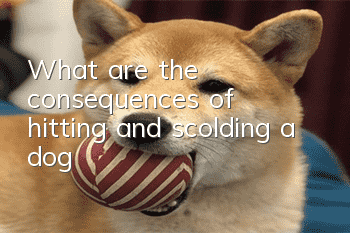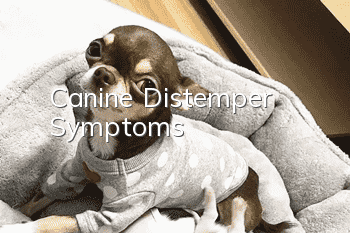What are the consequences of hitting and scolding a dog?

Beating and scolding education originated from the human family. If a person has never been punished by his parents, he will not know how to punish others. We have many behavioral patterns ourselves, all related to your family education. We all know that we don’t like to be scolded, but the education of beating and scolding has been embedded in our lives invisibly. Regarding the discipline of your own dog, when faced with the dog’s behavioral problems, because you can’t find a solution, you will use beating and scolding, because at the moment, you may see fake “effects”, such as At the beginning we mentioned "Trial and Error Learning".
In the middle of the night, your dog barked because he heard something moving outside. In order to stop the dog from making noise, you scolded or punished the dog. At that moment, the barking stopped temporarily because of your scolding or punishment, but The dog will bark more and more seriously in the future. Punishment only temporarily stops the barking on the surface, but it actually strengthens the barking behavior, because the dog gets a brief socialization with you after barking, including verbal socialization and even substantial social contact. . And this kind of "social contact" is exactly what dogs want.
Similar to "positive reinforcement", what is "positive reinforcement"? Positive reinforcement is: giving a dog something he likes to make the behavior happen more often. The situation here is: giving the dog the "social contact" he likes makes the "barking" behavior happen more often. So the final result of the punishment turns out to be: it strengthens the behavior and also makes the dog have a "fearful" reaction towards you. Beating and scolding education is the only way to make parents feel better after they can't find a solution to their children's bad behavior, because at least you have done something rather than nothing.
The reality is: you should enrich your knowledge before educating children or dogs.
Tips for coping: ↓↓↓↓↓↓
① Punishment can make an animal fearful: when it is punished, it temporarily stops its behavior because of fear. This fear will make it hide and be afraid of you, but it has no idea what is wrong.
②...Punishment will make dogs cower: Dogs who are often punished will be unwilling to do anything because they are afraid of being punished again, let alone try new behaviors. Try not to do anything, as it will hurt your soul. It's very pitiful.
③Punishment will give it another kind of reward: while punishing the dog, you also give it the greatest attention, and it receivesThe most important thing is "the coexistence of punishment and reward", because the reward is often far greater than the punishment. Instead of solving the problem, doing so aggravates it.
④ Punishment is often ineffective: Punishing two dogs that are fighting will not stop them from fighting, but they will fight when you can't see them, and the fighting will be more serious.
⑤ Punishment will increase the animal’s fear: Because the dog is afraid of barking at strangers, punishment will make it more afraid. It will mistakenly believe that the stranger who originally scared it will also cause you to punish it, so punishment is not only ineffective, but makes the dog more worried and fearful.
⑥Your punishment may be wrong: there will be more than one thing happening at the same time. How can you be sure that you can punish the behavior you want to punish?
⑦ Punishment leads to luck: Punishment often leads to luck, just like if you punish your dog for digging through the trash can, and you find him digging through the trash can, that is a punishment. Digging through the trash can without being discovered is a "lottery". Digging through the trash can becomes a "hope". This is the luck caused by punishment.
⑧Punishment may cause injury to the animal: The force that a dog can withstand is often beyond your control. In addition, you may lose control of your emotions and cause injury or death to the dog.
9. Punishment will cause loss of desire: When you punish it often, it will not know how to live with you and will be at a loss. It may even lose trust in you.
⑩Punishment may also cause you to be injured: not every dog will suffer punishment silently, and many dogs will fight back in order to protect themselves. When a dog fights back in order to protect itself, it is fighting back to protect its own life and can easily injure you.
- What to do if a puppy bites a chicken
- What are the treatments for Shiba Inu vomiting?
- How old can a dog take a bath?
- Be alert! List of dog food taboos!
- Canine Impetigo Causes | Diagnosis | Prevention and Treatment Methods
- How much does a black Labrador retriever cost? Black Labrador retriever price!
- Things to note when raising a Pomeranian
- Several causes of dog hair loss and solutions!
- What should I do if my dog vomits and won’t eat?
- Why does a dog vomit out dog food but it is still intact?



